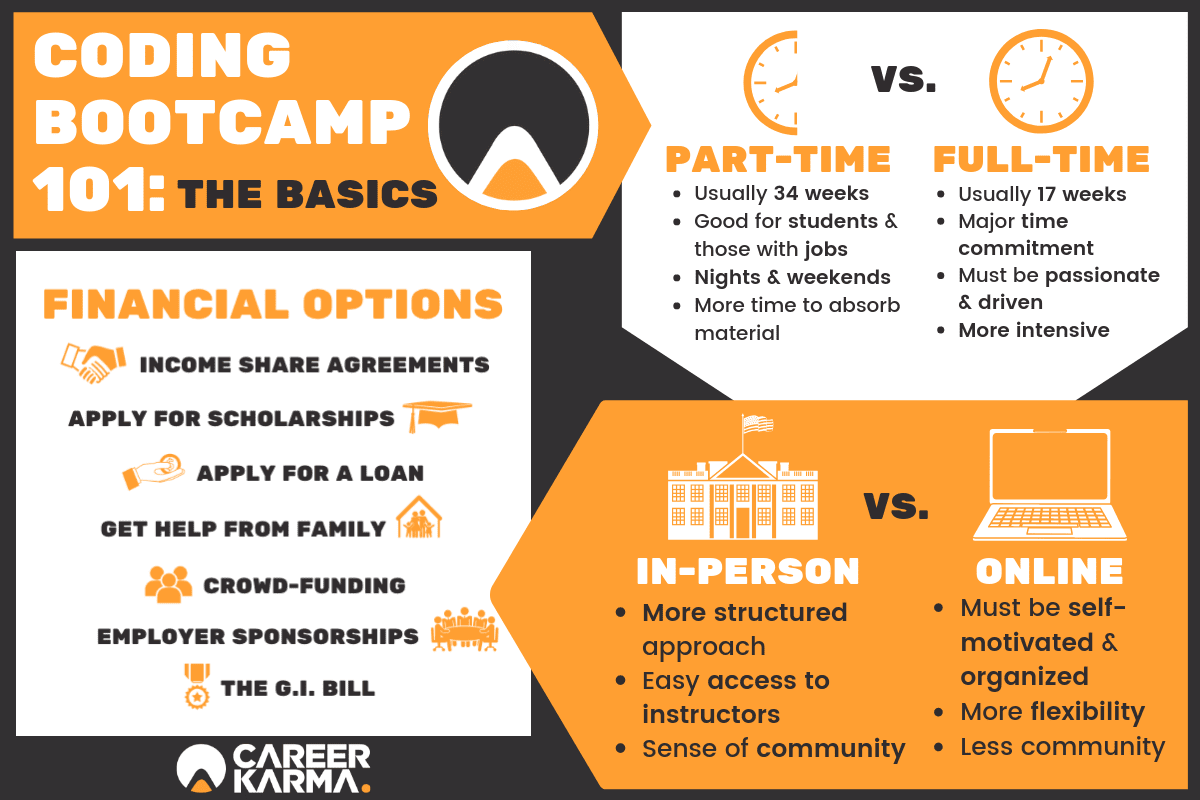What are Coding Bootcamps?: What Is Coding Bootcamps

Coding bootcamps are intensive, short-term programs designed to provide individuals with the skills necessary to pursue careers in software development and related fields. Their purpose is to rapidly equip students with practical, in-demand skills, enabling them to transition into tech roles more quickly than traditional educational pathways. Bootcamps focus heavily on hands-on projects and real-world application, often culminating in a portfolio showcasing student work.
Coding bootcamps typically cover a broad range of programming concepts and technologies. The curriculum usually includes foundational programming principles, such as data structures and algorithms, along with specific programming languages and frameworks relevant to the bootcamp’s focus (e.g., JavaScript, Python, React, Node.js). Students also learn about version control (like Git), databases, testing methodologies, and often, aspects of software design and development processes. The emphasis is on practical application, with students spending significant time building projects individually and collaboratively.
Coding Bootcamp Specializations
Coding bootcamps are not monolithic; they offer diverse specializations to cater to different career interests. Full-stack bootcamps provide a comprehensive education covering both front-end (user interface) and back-end (server-side logic) development. Front-end bootcamps focus solely on the client-side aspects of web development, emphasizing user experience and visual design. Back-end bootcamps concentrate on server-side programming, databases, and APIs. Data science bootcamps, on the other hand, equip students with the skills needed to analyze and interpret large datasets, using tools and techniques from statistics, machine learning, and data visualization. The choice of specialization depends on individual career goals and interests.
Coding Bootcamps vs. Traditional Computer Science Degrees
Coding bootcamps and traditional computer science (CS) degrees differ significantly in their approach, duration, and focus. CS degrees offer a more theoretical and comprehensive education, covering a wider range of computer science topics, including operating systems, computer architecture, and theoretical computer science. They typically take four years to complete. Bootcamps, conversely, are significantly shorter (often three to six months), intensely focused on practical skills directly applicable to industry jobs. While CS degrees provide a strong foundation for a variety of roles, bootcamps aim for rapid job placement in specific tech roles. The choice between a bootcamp and a CS degree depends on individual learning styles, career aspirations, and financial constraints. A CS degree might be preferable for those seeking a deeper understanding of computer science fundamentals and broader career options, while a bootcamp is often a more efficient and cost-effective pathway for individuals seeking a quicker entry into a specific tech role.
Choosing the Right Bootcamp

Selecting the right coding bootcamp is a crucial decision that can significantly impact your career trajectory. A well-chosen bootcamp provides the skills and network needed for success, while a poor choice can lead to wasted time and money. Therefore, a thorough and methodical approach to your search is essential. This involves careful consideration of several key factors to ensure the bootcamp aligns with your individual needs and goals.
Choosing a coding bootcamp requires careful research and comparison of different programs. Many factors contribute to a successful bootcamp experience, and neglecting any one of them could have negative consequences. A systematic approach will increase your chances of finding the perfect fit.
Factors to Consider When Selecting a Coding Bootcamp, What is coding bootcamps
Several important factors should be carefully weighed when choosing a coding bootcamp. These include location, curriculum, cost, and reputation, each impacting the overall learning experience and career prospects. Failing to consider these factors comprehensively could result in a less-than-optimal outcome.
- Location: Consider the proximity of the bootcamp to your home or desired place of employment. In-person bootcamps offer valuable networking opportunities and immersive learning, while online bootcamps provide flexibility and accessibility. The choice depends on your personal circumstances and learning style. For example, someone living in a rural area might find an online bootcamp more suitable, while someone seeking immediate networking opportunities might prefer an in-person program in a major tech hub.
- Curriculum: The curriculum should align with your career goals. Research the specific technologies and programming languages taught, ensuring they are relevant to your desired job roles. A well-structured curriculum should cover both theoretical concepts and practical application through projects. For instance, a bootcamp focused on web development should cover HTML, CSS, JavaScript, and potentially backend technologies like Node.js or Python/Django.
- Cost: Bootcamps vary significantly in price. Consider the total cost, including tuition fees, living expenses (if applicable), and any additional materials. Compare the cost against the potential return on investment (ROI) based on projected salary increases after completing the program. Financing options, such as loans or scholarships, should also be explored.
- Reputation: Research the bootcamp’s reputation through online reviews, alumni testimonials, and industry rankings. Look for consistent positive feedback regarding the quality of instruction, career support, and job placement rates. A high job placement rate indicates a strong track record of helping graduates secure employment in their chosen field. Websites like Course Report and SwitchUp provide valuable reviews and rankings.
A Step-by-Step Process for Evaluating and Choosing a Bootcamp
A structured approach to evaluating coding bootcamps increases the likelihood of selecting a program that meets your expectations and helps you achieve your career aspirations. This process ensures a thorough assessment of each program’s suitability.
- Identify Your Career Goals: Clearly define your career aspirations in the tech industry. This will guide your choice of programming languages and specializations.
- Create a Shortlist of Bootcamps: Based on your career goals and location preferences, research and create a shortlist of potential bootcamps.
- Thoroughly Research Each Bootcamp: Examine each bootcamp’s curriculum, cost, reputation, and career services. Look for reviews from past students and investigate their job placement rates.
- Compare Bootcamps Side-by-Side: Create a comparison table to objectively evaluate different bootcamps based on your prioritized criteria.
- Attend Info Sessions or Webinars: Attend informational sessions or webinars to learn more about the bootcamps and ask questions directly.
- Make Your Decision: Based on your research and comparisons, choose the bootcamp that best aligns with your needs and goals.
Resources for Researching Bootcamps
Numerous resources are available to help you research and compare coding bootcamps effectively. Utilizing these resources ensures a comprehensive understanding of each program’s strengths and weaknesses.
Several reputable websites provide reviews, rankings, and other helpful information about coding bootcamps. These include Course Report, SwitchUp, and even individual bootcamp websites themselves, which often showcase student testimonials and career placement statistics. Furthermore, networking with individuals who have completed bootcamps can provide valuable firsthand insights.


Tim Redaksi